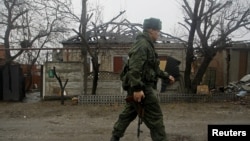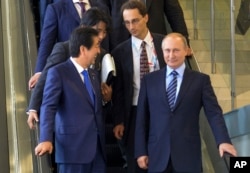With world leaders en route to China's Hangzhou city for Sunday's opening of the G20 summit, a senior Chinese diplomat announced that Russian President Vladimir Putin would be the number one guest. However Putin is already signaling that he plans to discuss geopolitical issues at the summit, possibly spoiling Beijing's preference for keeping talks mainly focused on the economy and the environment.
Russian media have reported the president is planning on meeting several world leaders which may include U.S. President Barack Obama, German Chancellor Angela Merkel, and Indian Prime Minister Narendra Modi besides Chinese President Xi Jinping.
These moves could undermine China's efforts to project Russia as a close friend and its efforts to reduce what Beijing considers to be too much western influence over the G20. Putin's purpose in meeting world leaders is to soften western wrath over its military intervention in Ukraine, analysts said.
Skin deep relationship
Analysts say Beijing has basically believed that Russia has become seriously dependent on China's support because of its economic problems, exacerbated by falling energy prices, and isolation by the west since the Ukraine crisis. But Putin is now showing that he can widen his circle of influence to connect with countries like Japan that Beijing sees as rivals.
"There is a particular game involving the Russians, which is that the Chinese know that the Russians are in difficult straits economically, and they have been kind of isolated by the west, and they need some friends," Arthur R. Kroeber, Founding Partner of consulting firm, Gavekal Dragonomics told VOA.
"I think it (the relationship) is definitely skin deep. There is very little trust, and there are actually very little interests in common other than the fact that authoritarian regimes have some difficulty convincing the democratic powers about their legitimacy. I think it (the relationship) is highly tactical, and i don't think strategically very meaningful," he said.
Ties with Japan
On Friday, Putin met with Japanese Prime Minister Shinzo Abe in the eastern Russian city Vladivostok, where the two discussed some economic proposals and the fate of four islands in Japan's far north that Russia seized near the end of World War II and has since refused to return. Ahead of the talks, Abe said he thought Russia is focused intently on developing its "Far East" region, and that the two would be able to more fully cooperate on issues.
Expressing its dissatisfaction over the moves, China's government-controlled Global Times said, "Japan's moves can easily be viewed as imposing geopolitical pressure on China through improving ties with Russia."
"The U.S. and Japan have the motivations to initiate a geopolitical competition with China, but China will not be made to give in," it said.
Obama is expected to raise the controversial issue of South China Sea in his talks with the Chinese president. China has been keen to ensure that the issue is not raised after an international tribunal rejected Beijing's claims over most of the sea area.
"China's overall ambition is to gradually overtime erode the influence of United States, and increase its own influence and do this under the guise of multilateral or multipolar approach," Kroeber said adding, "China conceives itself as a great power and one that rightfully must exercise much greater influence than what it has today."






